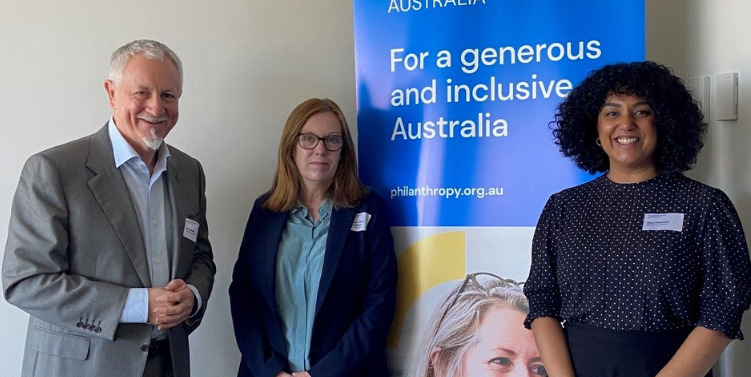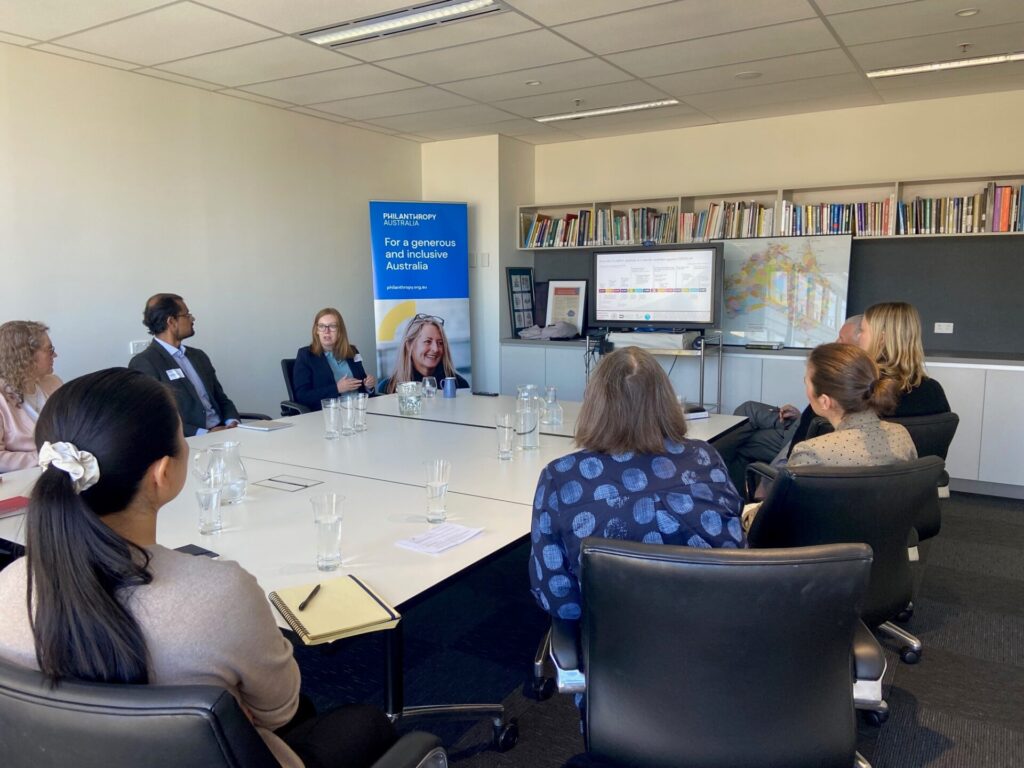
This week, Philanthropy Australia hosted a roundtable event with special guest Professor Dame Sarah Gilbert from the University of Oxford. Professor Gilbert is the co-developer of the Oxford-AstraZeneca COVID-19 vaccine and she spoke about philanthropy’s role in funding medical breakthroughs. Mary Chackola, Philanthropy Australia’s National Engagement Manager for Victoria and Tasmania, reflects on the discussion.
Banner image caption left to right: Jack Heath, CEO, Philanthropy Australia, Professor Dame Sarah Gilbert and Mary Chackola.
Professor Dame Sarah Gilbert’s bio is extremely impressive. She is the Said Professor of Vaccinology at the University of Oxford where she specialises in the development of vaccines against influenza and emerging viral pathogens including COVID-19, Nipah virus, MERS and Lassa virus.
Professor Gilbert’s work also focuses on the rapid transfer of vaccines into manufacturing and ‘first in human’ trials. She achieves this through collaboration with colleagues in the Clinical Biomanufacturing Facility and Centre for Clinical Vaccinology and Tropical Medicine, all situated on the Old Road campus in Oxford.
In January 2020, Professor Gilbert read a report on ProMED-mail about four people in China suffering from pneumonia of unknown origin in Wuhan. Within two weeks, a vaccine had been designed at Oxford against the new pathogen, which later became known as SARS-CoV-2, with the disease named COVID-19. On 30 December 2020, the Oxford–AstraZeneca COVID-19 vaccine she co-developed with the Oxford Vaccine Group was approved for use in the UK. More than 3 billion doses of the vaccine have been released to more than 170 countries worldwide and it is estimated to have saved over 6 million lives to date.
Amongst her many awards recognising her work, she received a damehood in the Queen’s 2021 Birthday Honours for services to science and public health.
The following reflections are my key takeaways from the discussion:
1. Long term funding enables medical research teams to attract and retain highly skilled researchers.
Longer term funding allows teams to avoid the inefficiencies of needing to retrain and onboard new team members more frequently.Professor Gilbert highlighted the challenges her team have faced in recruiting and retaining experienced staff when they only have short-term grants available. Philanthropy can play an important role in removing this obstacle by providing longer term grants that support retaining specialised knowledge, skills and team continuity.
2. Funding for pandemic preparedness will enable a calm and more efficient response in future times of crisis.
The NFP Oxford/AstraZeneca vaccine was developed and delivered rapidly thanks to the work of Professor Gilbert’s team, who had been planning for the arrival of a disease such as COVID-19 well before it was discovered.
Professor Gilbert explained the benefits of investing funds in stockpiling vaccines that may be needed for future pandemics, to allow for rapid distribution.
“In future, we hope to use philanthropic funding to add value to [academic/government] grant funding. One example is that in the Pandemic Sciences Institute at Oxford many groups are independently setting up clinical trials of vaccines and therapeutics and we want to include pregnant women in those trials as soon as possible. Funding one or two experts in this area to feed into many different trials rather than having each trials team addressing the issues independently would achieve huge impact at relatively low cost.”
The way in which government and philanthropic funding is invested today will support how the world is able to respond to future pandemics.
3. Unrestricted funding provides the flexibility and speed needed when working on medical breakthroughs/innovation.
Unrestricted funding supported Professor Gilbert’s team immensely when unplanned costs emerged during the development of the NFP Oxford/AstraZeneca vaccine:
“For our pandemic response in 2020, philanthropic funding enabled us to move fast, with multiple sources of flexible funding used to respond as soon as needs were identified. Supporting clinical trials staff with meals when we were working through lockdown, purchasing equipment to allow us to expand the trials, and helping set up remote working were all areas that our wonderful donors supported.” Professor Gilbert said.
